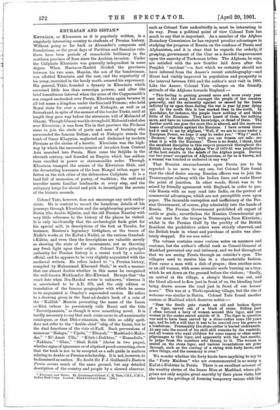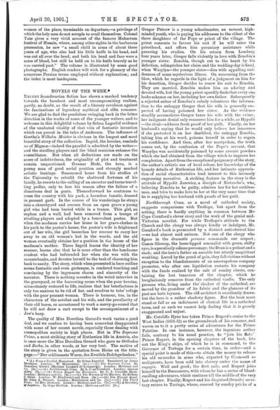KHURASAN AND SISTAN.*
KRunls'AN, or Khorassan as it is popularly written, is a singularly interesting country to students of Persian history. Without going so far back as Alexander's conquests and foundations, or the great days of Parthian and Sasanian rule, there have been periods of remarkable brilliancy in the northern province of Iran since the Arabian invasion. Under the Caliphate Khorasan was generally independent in some degree. When Haran-er-Rashid divided the provinces between his two sons, Mamiur, the son of the bondwoman, was allotted Khorasan and the east, and the superiority of his army, recruited in the hardy north, assured his supremacy. His general, Tahir, founded a dynasty in Khurtu3an which exercised little less than sovereign powers; and after the brief tumultuous interval when the arms of the Coppersmith's son ranged unchecked over Persia, Khorasan again became in all but name a kingdom under the Samanid Princes ; who held Royal state for over a century at NIshapar, as well as at Samarkand, in spite of the menace of the border Turks, until at length they gave way before the strenuous will of Mahmild of Ghazni. Though Ghazni was his stronghold, Mahmildruled also over Khurastur ; it was from Tag in that province the Firdausi came to join the circle of poets and men of learning who surrounded the famous Sultan ; and at Nishapar stands the tomb of Omar Khayyam, neglected and disdained by modern Persians as the shrine of a heretic. Khorasan was the high- way by which the successive armies of invaders from Central Asia marched into Persia. Here came the Seljaks in the eleventh century, and founded an Empire which has seldom been excelled in power or statesmanlike order. Through Khurasan tramped the armies of the Khwitrizm Shah, and the devastating horsemen of the lean Mongol tribes, eager to fatten on the rich cities of the defenceless Caliphate. It is a land full of memories, of poetry, of tradition ; the well-read traveller meets familiar landmarks at every step, and the antiquary longs for shovel and pick to investigate the secrets of the historic mounds.
Colonel Yate, however, does not encourage any such enthu- siasts. He is content to record the humdrum details of his journeys through Khurastan and the neighbouring province of Sistan (the Arabic Sijistan, and the old Persian Nauraz) with very little reference to the history of the places he visited. It is only incidentally that the archeologist finds grist for his special mill, in descriptions of the fort at Taraku, for instance, Rustem's legendary birthplace, or the traces of Nadir's works at the Kal`at-i-Nadiri, or the curious Gumbad- i-Kabas, and even then the descriptions are valuable merely as showing the state of the monuments, not as throwing any fresh light upon their origin. Colonel Yate's principal authority for Persian history is a recent work by a native official, and he appears to be very slightly acquainted with the medieval writers. He refers indeed to " a Persian history, compiled by Muhammad Khavand Shah," in such a manner that one almost doubts whether in this name he recognised the well-known Mirkhondor Mir-Khwand. He says that" the exact date when Ibu-Haukal wrote is unknown," whereas it is ascertained to be A.D. 978, and the only edition or translation of the famous geographer with which he seems to be acquainted is Ouseley's superseded version. He refers to a drawing given in the Sani-ad-daula's book of a coin of the " Kalifah " Maman presenting the name of the Imam er-Riza (whom he persistently calls Raza) and the title " Zavviriyasatain," as though it were something novel. It is hardly necessary to say that such coins occur in all numismatic catalogues, or that Dhir-r-rifuTatain, the title so oddly spelt, does not refer to the "double chief "-ship of the Imam, but to the dual functions of the vizir el-Fadl. Such perversions of names as " Halagu," " Ujaita," " Eltayah," " Mashhad-i-Maka- das," " Ni'-Amat Ulla," " Kilah-i-Dukhtar," " Hamadulla," "Nakhara," " Ghaz," " Shah Ruhk " (thrice in two pages), whether signs of ignorance or of slipshod proof-correcting, show that the book is not to be accepted as a safe guide in matters relating to Arabic or Persian scholarship. It is not, however, to be dismissed as useless. No doubt Sir F. J. Goldsmid's Eastern Persia covers much of the same ground, but any detailed description of the country and people by a shrewd observer,
• Khorasan and Sistan. By Lieutenant-Colonel C. E. Yate, C S.L, 03I.G., Indian Staff Corps. London : Blackwood and Sons. [16s.]
such as Colonel Yate undoubtedly is, must be interesting in its way. From a political point of view Colonel Yate has much to say that is important. As a member of the Afghan Boundary Commission he has enjoyed peculiar advantages in
studying the progress of Russia on the confines of Persia and Afghanistan, and it is clear that he regards the orderly, if grasping, government of the Czar as a decided improvement upon the anarchy of Turkoman tribes. The Afghans, be says, are satisfied with the new frontier laid down after the Penjdeh " incident "—a fact which we certainly should not have inferred from the Ameer's recent autobiography—and Herat had visibly improved in population and prosperity in the interval between 1885 and the author's next visit in 1893. Like the Ameer, Colonel Yate enlarges on the friendly attitude of the Afghans towards England :—
" This feeling is gaining ground more and more every year not only in the army, but amongst the people of the country generally, and the animosity against us caused by the losses inflicted by us upon them during the war is year by year dying out. In the south this is less marked than in the north. In Kandahar, for instance, the people know nothing of and think little of the Russians. They have heard of them, but nothing more, and have no immediate knowledge, or dread of them. The farther north one goes the more this is altered, and the more one hears of complaints against the Russians. I have several times had it said to me by Afghans, Well, if we are to come under a European Power, we hope it may be under you.' Why ?' said I. ' Because,' was the reply, with you our women are safe : see what it is with the Russians.' There is no doubt, I think, that the excellent discipline in this respect preserved throughout the British Army during the Afghan War of 1879-81 was productive of the best results in the minds of the Afghan people. During our two years' occupation of Afghanistan, so far as is known, not a woman was touched or molested in any way."
That Russian encroachments upon Persia are to be expected is no news to any one, but Colonel Yate found that the chief desire among Russian officers was to join the Transcaspian railway with the Indian lines, and make Herat the point of junction. In other words, Herat was to be
seized by friendly agreement with England, in order to pro- vide Russia with an easy road into India, on the pretext of commercial advantages, which are not perceptible even upon paper. The incurable corruption and inefficiency of the Per- sian Government, of course, play admirably into the hands of Russia.. The Persian Government prohibited all export of cattle or grain ; nevertheless the Russian Commissariat got all the meat for the troops in Transcaspia from Kkurirsan ; whilst in the Persian Gulf by the probity of the British Resident the prohibitive orders were strictly observed, and the British trade in wheat and purchase of mules was abso- lutely stopped. Sic vos non vobis
The volume contains some curious notes on manners and customs, but the author's official rank as Consul-General at Mashhad prevented any real intimacy, and we feel throughout that we are seeing Persia through an outsider's eyes. The villagers used to receive him in a characteristic fashion. First came a man with a dish of grapes ; then another man, or an old woman, with some aromatic seeds burning on a tray, which he set down on the ground before the visitors; "finally, on arrival at the village, a sheep's throat was cut, and the blood allowed to flow just in front of us, the bleeding head being drawn across the road just in front of our horses' noses." This was at a Turki-speaking village, but the rite of welcome was similar in Sistan. Colonel Tate found another custom at Mashhad which deserves notice
"Near the Surat) gate stands an old and broken figure of a tiger, carved out of a block of stone. Riding past I often noticed a bevy of women around this tiger, and one woman in the centre seated astride of it. The tiger in question was said to have been carved by a stone-cutter some 150 years ago, and he left a will that it was to be erected over his grave as a tombstone. Presumably the stone-cutter is buried underneath. At any rate the record of his skill still remains by the roadside, and all women who want children for some reason or other make pilgrimages to this tiger, and apparently with the best results, to judge from the numbers who throng to it. The woman is seated on the stone tiger, and various incantations are gone through, such as the cutting of a string with forty knots, and other things, and the ceremony is over."
We wonder whether the forty knots have anything to say to
the " Forty Maidens" who are commemorated in so many a Kal'at-i-Dukhtar in Persia. There is an excellent account of the wealthy shrine of the Imam Riza at Mashhad, where pil- grims not only acquire great sanctity by their pious visits, but also have the privilege of forming temporary unions with the
women of the place, terminable on departure,—a privilege of which the holy men do not scruple to avail themselves. Colonel Yale gives a very vivid account of the famous Mullarram festival of Husain, where, among other sights in the barbarous procession, he saw " a small child in arms of about three years of age, who also had his little knife in his hand, and was cut all over the head, and both his head and face were a mass of blood, but still he held on to his knife bravely as he was carried past." The volume is illustrated by some good photographs. English readers will wish for a glossary of the numerous Persian terms employed without explanation; and the index is most inadequate.







































 Previous page
Previous page